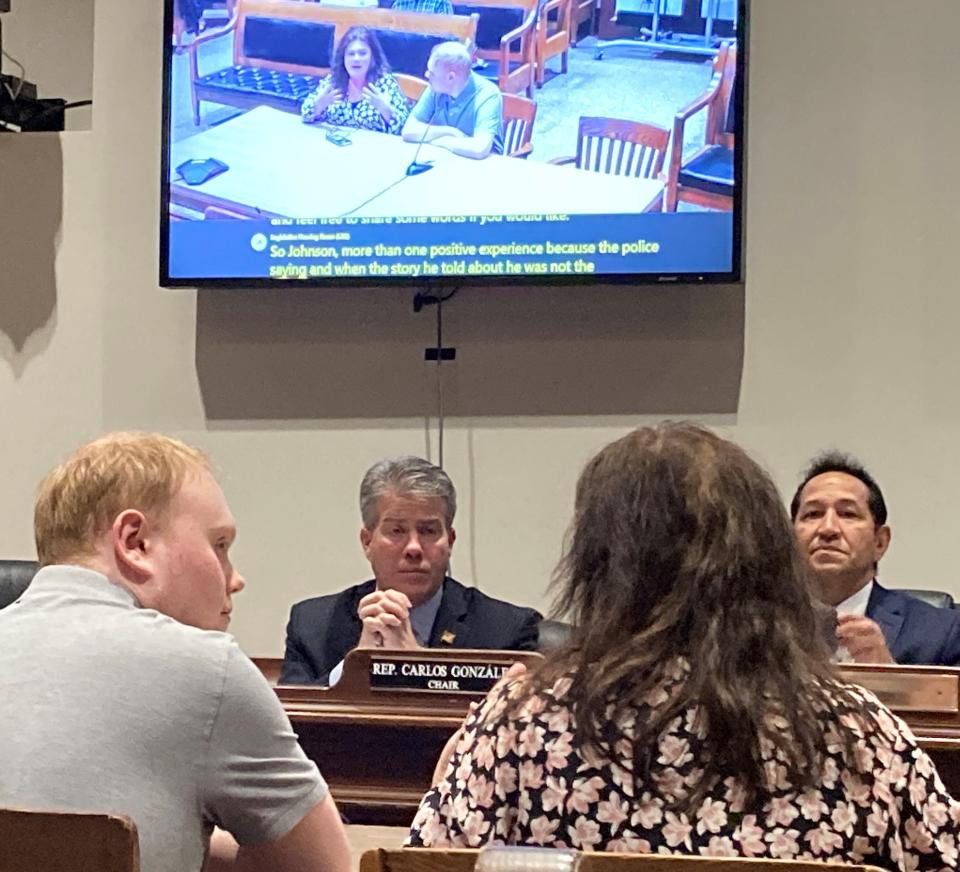Westborough woman joins others in urging autism awareness training for cops
BOSTON ― Luckily, the encounter between a Westborough woman’s autistic adult son and a local police officer who knew him ended well. But because Sam Kanji has no outward indicators of his disability, it could have ended badly.
Ilyse Levine-Kanji, a former School Committee member and an advocate for people with disabilities, told the Joint Committee on Public Safety and Homeland Security Monday that it is imperative for the safety of the autistic community, and the safety of police, that the state pass a measure to extend training to veteran police officers on interacting with its members.

Massachusetts already requires police cadets to undergo training on how to approach people with autism spectrum disorder and other intellectual and developmental disabilities. The bill, sponsored by Sen. Michael O. Moore, D-Millbury and Rep. Kay Kahn, D-Newton, would extend the training to veteran officers.
The measure would require the municipal police training commission to establish in-service training for police and corrections officers that would be incorporated into current in-service training and include presentations by people diagnosed as on the spectrum, as well as advocates and service providers.
The bill would train offers on speaking with or interrogating autistic people, finding runaways, detaining people and how to differentiate people with autism from those suffering from other disabilities.
Levine-Kanji said the interaction between her son and the officer started when a local business called about the young man, reporting that he had been acting suspiciously, spending a few minutes in the building before driving off.
“A police officer came to our home, and luckily, he knew Sam, my son had introduced himself at an earlier block party,” Levine-Kanji said. She explained that her son loves elevators and was accessing the building to take a ride.
The Blue Envelope Bill
“I cringe thinking about what could have happened if the officer didn’t know Sam,” Levine-Kanji said.
Her son, now 25, becomes overwhelmed in stressful situations and may be too nervous to follow basic instructions. She praised another measure, currently before the Joint Committee on Ways and Means, that would identify carriers of state-issued blue envelopes as autistic or suffering from intellectual or developmental delays.
The envelopes could be presented to law enforcement officials as a way of alerting police that the carriers are not defiant but are unable to respond correctly.
“All law enforcement officials need training to know what to do,” Levine-Kanji said.
Christine Hubbard, also of Westborough, is an advocate for people with disabilities and the mother of an autistic man. She said her son, Ned, is unable to drive but loves to ride in cars.
When Ned, now 36, was 12, he was in an overcrowded school van when he became dysregulated and acted out, pulling the ponytail of the girl sitting in front of him. The driver called for help and six patrol cars responded.
The boy was removed from the van in handcuffs and had his legs shackled before being put into the back of a patrol car and driven away, Hubbard said.
In contrast, Hubbard told the committee of a more recent incident when her son slipped from home and ran down the center lane of a busy street.
“It was after police started receiving training,” Hubbard said. “Neighbors called police; EMS and firefighters responded. By the time I arrived — I don’t run as fast as he does — he had been collared and calmed and was sitting in the back of an ambulance chatting with EMTs and local firefighters. They sat with him until I arrived.”
Contrast between reactions pre- and postautism awareness training
The contrast between the two incidents and the response of emergency personnel was remarkable, Hubbard said.
Maura Sullivan, senior director of public affairs and health policy with The Arc of Massachusetts and the mother of autistic sons, said one son, Tyler, had established a relationship with a police officer in her hometown of Waltham, Paul Tracey.
Tracey died last week, as did a National Grid utility worker, when they were struck by a car at a road construction site.
“He learned from Tyler,” Sullivan said, choking up momentarily.
Sullivan said her adult sons respond to stress by becoming agitated and aggressive, and they have a tendency to run, behavior that can be misconstrued by police. While her sons’ interactions with law enforcement have not been traumatic, that is not always the case with others, she pointed out.
Traumatic arrests not uncommon in autistic community
“Traumatic arrests are not uncommon in the autism community,” Sullivan said. She said that one in 36 people is born and diagnosed as on the autism spectrum, and one in four of those will have encounters with police.
According to the Organization for Autism Research, “media reports consistently document negative interactions between law enforcement officers and autistic individuals that often quickly escalate, resulting in unnecessary use of force, trauma and even death.”

Jonathan Gardner, 21, of East Bridgewater, spoke on his own behalf.
His mother, Nancy, made him a special identification card that would alert police that he was on the autism spectrum.
“When I was younger, I was in a car when a police officer tapped on the window,” Gardner told the committee. “I was nervous, but I pulled out my ID.”
The document indicated that he has difficulty speaking with strangers and in stressful situations.
“The officer was nice; he called my mom,” Gardner said. His mother told the legislators that the two had practiced how Jonathan was to respond in that kind of situation, especially if he was not with her at the time.
“I feel privileged that our family has had no bad experiences with police, that they have been positive,” said Nancy Gardner. “But what if Jonathan had been a different color and he was reaching into his pocket for his ID? That is my concern.”
This article originally appeared on Telegram & Gazette: Mass. bill would require autism awareness training for police officers

